
The Gospel of Matthew is the first book of the New Testament of the Bible and one of the three synoptic Gospels. It tells how Israel's Messiah, Jesus, comes to his people and forms a community of disciples, of how he taught the people through such events as the Sermon on the Mount and its Beatitudes, and how Israel becomes divided and how Jesus condemns this hostile Israel. This culminates in his departure from the Temple and his execution. At this point many people reject Jesus, and on his resurrection he sends the disciples to the gentiles.

Matthew 1 is the first chapter of the Gospel of Matthew in the New Testament. It contains two distinct sections. The first lists the genealogy of Jesus from Abraham to his legal father Joseph, husband of Mary, his mother. The second part, beginning at verse 18, provides an account of the virgin birth of Jesus Christ.

Matthew 2:4 is the fourth verse of the second chapter of the Gospel of Matthew in the New Testament. The magi have informed King Herod that they had seen portents showing the birth of the King of the Jews. In this verse he calls together leading figures of Jerusalem to find out where Jesus was to be born.

Matthew 2:9 is the ninth verse of the second chapter of the Gospel of Matthew in the New Testament. King Herod has dispatched the magi to Bethlehem to find the infant Jesus. In this verse they follow the Star of Bethlehem to find the infant.

Matthew 4:1 is the first verse of the fourth chapter of the Gospel of Matthew in the New Testament. This verse opens the section in Matthew dealing with the temptation of Christ by Satan. Jesus has just been baptized by John the Baptist; in this verse he is led out into the wilderness.
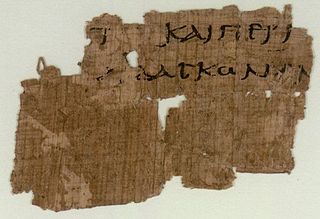
Matthew 4 is the fourth chapter of the Gospel of Matthew in the New Testament of Christian Bible. Many translations of the gospel and biblical commentaries separate the first section of chapter 4 from the remaining sections, which deal with Jesus' first public preaching and the gathering of his first disciples.

Matthew 4:3 is the third verse of the fourth chapter of the Gospel of Matthew in the New Testament. This verse opens the section in Matthew dealing with the temptation of Christ by Satan. Jesus has been fasting for forty days and forty nights, and in this verse the devil gives Christ his first temptation by encouraging him to use his powers to get food.
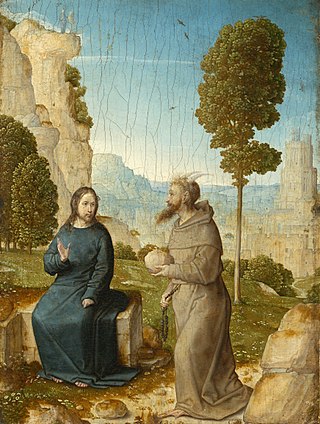
Matthew 4:4 is the fourth verse of the fourth chapter of the Gospel of Matthew in the New Testament. Jesus, who has been fasting in the desert, has just been tempted by Satan to make bread from stones to relieve his hunger, and in this verse he rejects this idea.
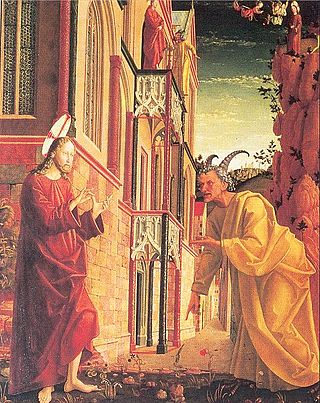
Matthew 4:5 is the fifth verse of the fourth chapter of the Gospel of Matthew in the New Testament. Jesus has just rebuffed Satan's first temptation, and in this verse the devil transports him to the site of the second temptation.

Matthew 4:6 is the sixth verse of the fourth chapter of the Gospel of Matthew in the New Testament. Jesus has just rebuffed "the tempter's" first temptation; in this verse, the devil presents Jesus with a second temptation while they are standing on the pinnacle of the temple in the "holy city" (Jerusalem).

Matthew 4:7 is the seventh verse of the fourth chapter of the Gospel of Matthew in the New Testament. Satan has transported Jesus to the pinnacle of the Temple of Jerusalem and told Jesus that he should throw himself down, as God in Psalm 91 promised that no harm would befall him. In this verse, Jesus quotes scripture to rebuff the devil.
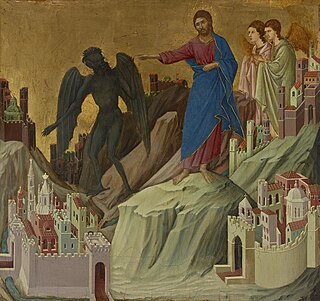
Matthew 4:8 is the eighth verse of the fourth chapter of the Gospel of Matthew in the New Testament. Jesus has just rejected Satan's second temptation. In this verse the devil transports Jesus to a new location for the third temptation.
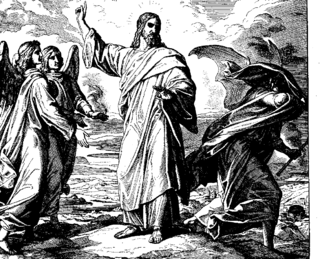
Matthew 4:10 is the tenth verse of the fourth chapter of the Gospel of Matthew in the New Testament. Jesus has rebuffed two earlier temptations by Satan. The devil has thus transported Jesus to the top of a great mountain and offered him control of the world to Jesus if he agrees to worship him. In this verse, Jesus rejects this temptation.

Matthew 4:11 is the eleventh verse of the fourth chapter of the Gospel of Matthew in the New Testament. Jesus has just rebuffed Satan's third temptation and ordered him away. In this last verse of the temptation scene, the devil departs and Jesus is serviced by angels.

Matthew 4:16 is the sixteenth verse of the fourth chapter of the Gospel of Matthew in the New Testament. In the previous verses Jesus returned to Galilee after hearing of the arrest of John the Baptist and then left Nazareth for Capernaum. This verse contains the second half of a quote from the Book of Isaiah, implying that these movements were preordained by scripture.

Matthew 6:13 is the thirteenth verse of the sixth chapter of the Gospel of Matthew in the New Testament, and forms part of the Sermon on the Mount. This verse is the fifth and final one of the Lord's Prayer, one of the best known parts of the entire New Testament.

The temptation of Christ is a biblical narrative detailed in the gospels of Matthew, Mark, and Luke. After being baptized by John the Baptist, Jesus was tempted by the devil after 40 days and nights of fasting in the Judaean Desert. At the time, Satan came to Jesus and tried to tempt him. Jesus having refused each temptation, Satan then departed and Jesus returned to Galilee to begin his ministry. During this entire time of spiritual battle, Jesus was fasting.
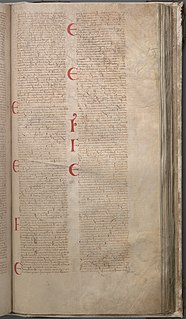
Luke 4 is the fourth chapter of the Gospel of Luke in the New Testament of the Christian Bible, traditionally attributed to Luke the Evangelist, a companion of Paul the Apostle on his missionary journeys. This chapter details Jesus' three temptations, the start of his "Galilean Ministry", and his rejection at Nazareth, which Luke contrasts with his acclaim in nearby Capernaum.

Matthew 27:11 is the eleventh verse of the twenty-seventh chapter of the Gospel of Matthew in the New Testament. This verse brings the narrative back to Pilate's Court, and the final trial of Jesus.

The Quran, the central religious text of Islam, contains references to more than fifty people and events also found in the Bible. While the stories told in each book are generally comparable, there are also some notable differences. Knowing that versions written in the Hebrew Bible and the Christian New Testament does predate the Quran, Christians reason the Quran as being derived directly or indirectly from the earlier materials. Muslims understand the Quran to be knowledge from an omnipotent God. As such, some Muslims believe that the earlier versions are distorted through flawed processes of transmission and interpretation over time, and consider the Quran's version to be more accurate.




















